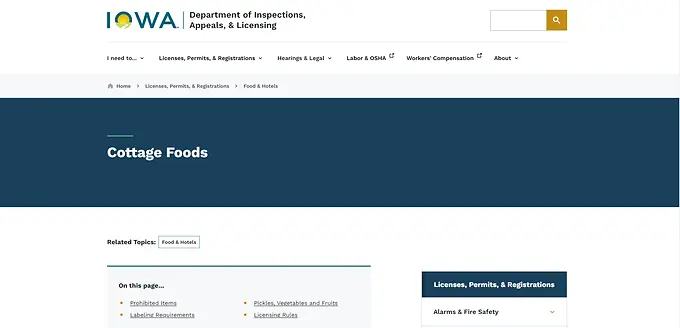Cottage Food Laws in Iowa [2026 Update]
Overview of Guidance and Ordinances for Cottage Food Laws in Iowa
"Cottage foods" refer to food items crafted in a private residence and exempted from formal licensing or inspection. As per the new legislation, these foods must fulfill specific criteria: they're prepared at home, don't demand temperature control for safety, are directly sold by the producer to the consumer, and are appropriately labeled. They can solely be vended at temporary food establishments, provided these are run by the producer and the items are packaged and labeled accordingly.
Food Labeling Requirements according to Iowa Cottage Food Laws
Cottage food labels must include the preparer's contact information, the food's name, ingredients listed by predominance, and a specific statement indicating exemption from state licensing and inspection. If the food contains major allergens, they must be clearly identified on the label. Additionally, for home-processed pickles, vegetables, or fruits, the label should include the processing and canning date.
Summarized Business Regulations for Cottage Food Laws in Iowa
A cottage food operation in Iowa is a food business that is run out of a private residence. The food that is produced must be non-potentially hazardous, meaning that it does not require time or temperature control for safety. Examples of cottage foods in Iowa include baked goods, jams, jellies, and granola. Cottage food producers in Iowa are not required to obtain a license or permit, but they must follow certain labeling and safety guidelines.

Iowa Department of Inspections, Appeals, and Licensing
This dashboard is provided as an informational resource and is not affiliated with the above department. While we strive to keep our information accurate and up to date, we do not claim to provide official legal advice or representations regarding cottage food laws or any other regulations. Laws and regulations can change frequently, and they can vary significantly by location. We encourage all users to consult their local health department or a legal professional to obtain the most current information and advice specific to their circumstances.

![Fast Track to Start a Food Truck Business in Iowa [2026 Bundle with Guides, Calculators and Full Business Plan]](https://static.wixstatic.com/media/aec654_b98314b541e34ecbbd6089492af8652a~mv2.jpg/v1/fill/w_285,h_285,al_c,q_80,usm_0.66_1.00_0.01,enc_avif,quality_auto/Start%20a%20Food%20Truck%20in%20Alabama_JPG.jpg)